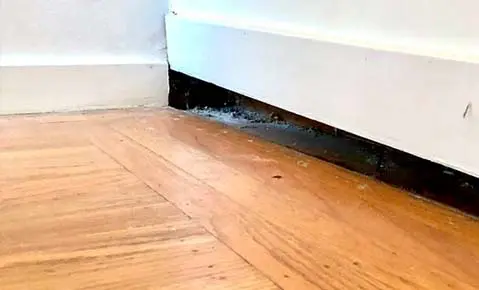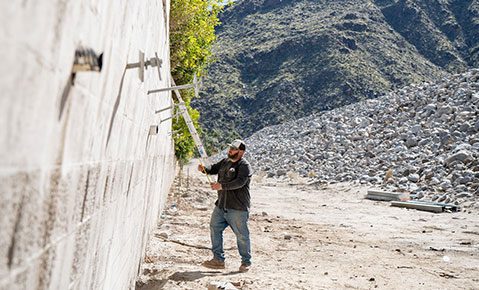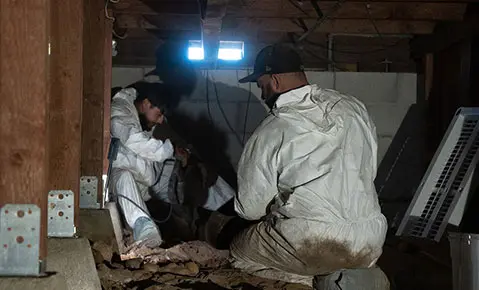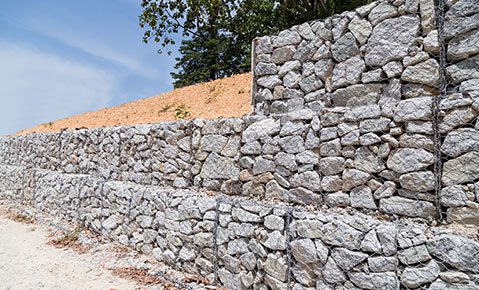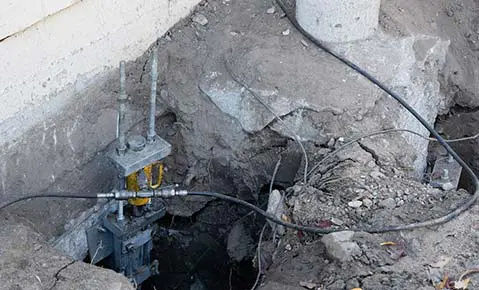If you’re finding puddles sitting next to your home or a pipe has leaked, you might have an issue. If you’re dealing with flooding, it goes without saying you have an issue at hand. Either way, moisture of any severity is going to affect your foundation.
The last thing to give your comfort is seeing puddles or other large forms of water staying well past their welcome, acting like a couch potato – without the couch. And like someone who stays too long, you start to notice problems that affect your home.
Dalinghaus Construction has inspected over 10,000 homes in Southern California, Arizona, and Nevada, with around 95% of the foundation problems we deal with pertaining to moisture in some form. We’ve seen everything from homes settling, thrust up from heaving, and concrete spalling as though the flaking is trying to become a new ice cream topping.
It’s important to us that you know how your foundation is affected by moisture.
Why would my foundation deal with moisture?
It’s practically impossible for your home not to deal with moisture. You have the pipes in your home that carry water and the weather to deal with outside. And like humidity can affect you on some days, it can also affect your home.
Though it’s not like a little mist will cause substantial damage. It’s some form of water intrusion causing issues in abundance.
Plumbing issues
You sometimes deal with pressurized leaks in your home you didn’t expect. That moisture will saturate the soil under your home and cause movement. This can also cause the soil to shift and move as the water navigates through, creating voids underneath, resulting in sagging and cracks.
Slab leaks are an occasional occurrence that can cause long-term damage if left untreated. Plus, you take a hit to your wallet when you see the water bill.
Pro-tip – if you turn off the water to your home and see the needle on the water meter still shifting, that can indicate some type of leak.
Weather
Sometimes clouds like to say “hi” with their happy wet tears hitting your home. Sometimes it drizzles. Sometimes it rains. There are times that when it rains, it pours. And sometimes when it pours, it floods – depending on the location of your home, of course.
External factors will always affect your home rain or shine. Weather is doing its thing all the time.
Weather coincides hand-in-hand with the next cause…
Improper drainage
If you have proper drainage, rain or water irrigation shouldn’t be an issue.
You can still have a proper irrigation system so long as it isn’t broken or leaking.
Improper drainage will cause water to build up next to your home. Expansive soils naturally expand and contract, resulting in your foundation cracking, sagging, fracturing, and weakening.
Addressing drainage problems
While you can fix drainage issues on your own, a drainage DIY project isn’t recommended. You need to have proper fall, where the moisture is diverting, and you need to check the pitch.
A licensed landscaper would be your best bet to address drainage. They are professionals and do the job every day. If you can find a well-received landscaper, consider giving them a go so you don’t have to worry about moisture hanging out with your home too much.
Symptoms of excessive moisture
- Swelling of wood
- Efflorescence
- Calcium buildup
- Concrete Spalling
- You’ll notice discoloration in the wood
- Stagnating puddles next to your home
Why you should be concerned about moisture in your home
Moisture is about 95% of our business. Proper compaction helps your home deal with moisture better, but moisture will still affect your home. Improper drainage will affect your home with proper compaction.
Water will erode the soil underneath your home and worsen the damage to your foundation. After all, water will find the path of the least resistance.
Even with a high soil compaction rate, water can exacerbate the settlement process. And if the water has nowhere to go because of improper drainage, your foundation issues are guaranteed to be worse as the soil erodes.
Some things can’t be helped such as a pressurized water leak. That isn’t as much of a drainage issue so much as it is unfortunate circumstances.
Water can cause a lot of damage
Water sitting in one area will cause damage to concrete via spalling – where concrete starts to flake off. The inner channels of the concrete
Water will also soak into the concrete and make contact with the rebar. This is a slow process, but it can happen if left unattended.
Fun fact – While concrete is very dense, it is still porous, meaning the water can make its way to the rebar in your foundation. The holes that are a fraction of the size of a strand of hair create what is called a capillary tunnel.
You’re more than likely going to find water seeping through the cracks in the concrete to cause rebar to oxidize (aka rust). When rebar oxidizes, expands, creating more problems with the concrete that doesn’t like to move as it is. Oxidation will make the crack worse.
You’ll often see this damage in conjunction with foundation heaving.
Foundation heaving
This phenomenon is when expansive soils take in moisture, causing them to…well, expand. The result is an area of your house being thrust upward, causing damage to your home.
While this isn’t seen as often as foundation settlement, it is still very common. It depends on the elasticity of the soil, though along the coast and other areas have very expansive soil.
You’ve learned how your foundation handles moisture. Schedule a free evaluation to see if moisture is affecting your home.
You’ve learned about why the foundation of your home would deal with moisture, addressing drainage, signs and symptoms of excessive moisture, and why you should be concerned about excessive moisture in your home. If you’re concerned about improper drainage or moisture affecting your foundation, there’s no harm in scheduling a FREE evaluation.
You want to make sure your home is protected as best as possible. You may be seeing these signs and are still unsure about the severity of your foundation issues. That’s why you’ll want a professional to come out and inspect your home with an honest assessment.
For additional questions or to schedule a free evaluation, call Dalinghaus Construction at (877)360-9277.


